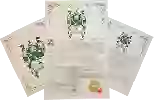
Cave Beaumont du VentouxCôtes-du-Rhône
This wine generally goes well with beef, game (deer, venison) or lamb.
Food and wine pairings with Côtes-du-Rhône
Pairings that work perfectly with Côtes-du-Rhône
Original food and wine pairings with Côtes-du-Rhône
The Côtes-du-Rhône of Cave Beaumont du Ventoux matches generally quite well with dishes of beef, lamb or game (deer, venison) such as recipes of roasted fillet of beef with parsley, lamb tagine with honey and onions or duck with olives.
Details and technical informations about Cave Beaumont du Ventoux's Côtes-du-Rhône.
Discover the grape variety: Alval
Intraspecific crossing obtained in 1958 between the dabouki and the Alphonse Lavallée, registered in the Official Catalogue of table and wine grape varieties (double end) list A1.
Informations about the Cave Beaumont du Ventoux
The Cave Beaumont du Ventoux is one of of the world's great estates. It offers 34 wines for sale in the of Côtes-du-Rhône to come and discover on site or to buy online.
The wine region of Côtes-du-Rhône
The wine region of Côtes-du-Rhône is located in the region of Rhône méridional of Rhone Valley of France. Wineries and vineyards like the Château de Beaucastel or the Chateau de Fonsalette produce mainly wines red, white and pink. The most planted grape varieties in the region of Côtes-du-Rhône are Mourvèdre, Viognier and Marsanne, they are then used in wines in blends or as a single variety. On the nose of Côtes-du-Rhône often reveals types of flavors of pineapple, red plum or sour cherry and sometimes also flavors of truffle, juniper or clove.
The wine region of Rhone Valley
The Rhone Valley is a key wine-producing region in Southeastern France. It follows the North-south course of the Rhône for nearly 240 km, from Lyon to the Rhône delta (Bouches-du-Rhône), near the Mediterranean coast. The Length of the valley means that Rhône wines are the product of a wide variety of soil types and mesoclimates. The viticultural areas of the region cover such a distance that there is a widely accepted division between its northern and southern parts.
The word of the wine: Lemonade maker
Corkscrew of the wine waiter equipped with a small blade allowing to cut the capsule, a worm and a system of rack allowing to extract the cork easily.














